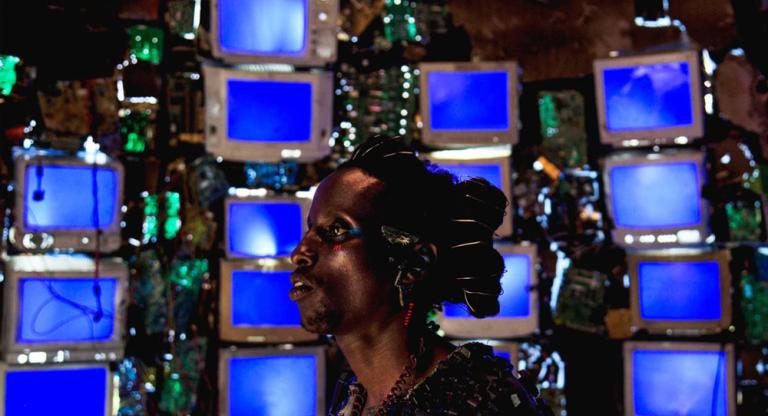Alain Gomis’s Tey (2012) opens with a shot of the sea: murky, swelling, impossible. We won’t see the sea again in the film, though Tey finds oceanic magnitudes in its lead actor, Saul Williams. Watching the film, with its dreaminess and long, doting close-ups of Williams, is an intimate affair, tethered between passion and intrusion. Cinema for Gomis, as he described in a 2013 interview, is about “sensation." In Tey, this sensation is moribund: Williams plays Satché, a young Senegalese man who will die tomorrow. The film follows Satché's final day, scattered between figures of the past and the future. Central to Tey is Williams’s face, which seems magnificently timeless, wrought with both sagacity and fragility.
Upon waking up, Satché learns of his fate from his weeping family. We learn very little about Satché: he was a “good son,” a “good brother, and a “good father,” his own father says. Another relative interjects: Satché was also “selfish,” “a loner,” and “full of rage.” We also learn very little about why Satché must die—such terms and conditions are negligible in Gomis’s dreamscape. On his final day, Satché wanders through Dakar. He meets the man who will embalm his body. A crowd celebrates him, chanting his name. Satché is a hero, perhaps, because he seems to have confronted the problem of death with grace. Satché also encounters his first love (Aïssa Maïga), who taunts him. The two engage in a tango of buried vendettas. “You’re going to die, but you haven’t lived,” she says to Satché, leering. He stumbles out onto the street in a panic.
Tey, like the sea, is unconcerned with specificity. Questions drift ceaselessly upon its meandering structure. Who is Satché, this selfish, “good” son who must die? Who are these people he meets along the way, who appear to be worn by a world in flames and turmoil? The questions that loom in Tey are not only of today, but of the future that Satché will never see. As he considers his life, Satché—himself a father—thinks about his country. “What will become of our children tomorrow?” a woman asks, outraged about the corruption of then-president Abdoulaye Wade. Gomis lingers on children: their prying hands, their widening eyes. They are innocent, in spite of this world in which the days pass mercilessly, and people must die—often without knowing why. Tey, even with all its rage and fury, ends on a note of ordinary slumber, as if this day were just like any other.
Tey opens tonight, June 10, and screens through June 16 at BAM




